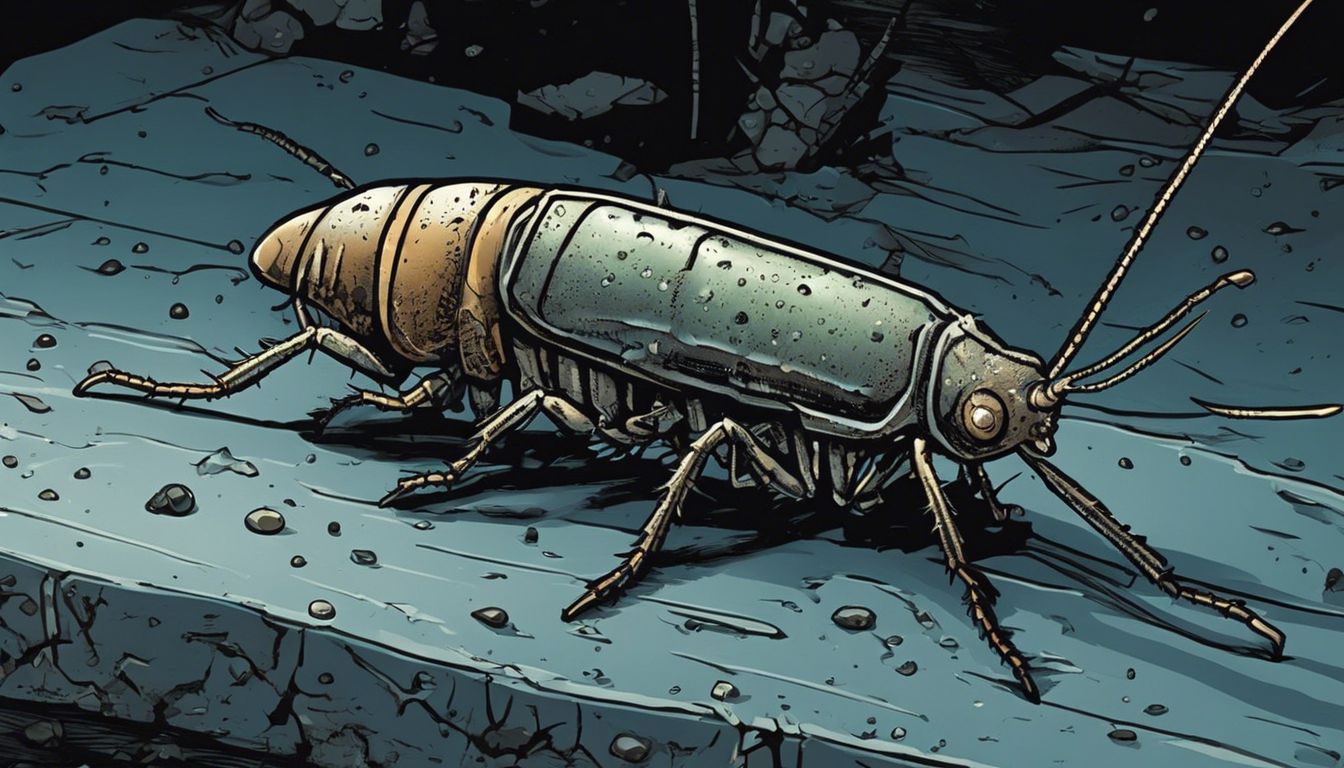“This post contains affiliate links. As an Amazon Associate, I earn from qualifying purchases”
Are you noticing tiny, silver critters zipping around your home? You’re not alone! Silverfish are common household pests that can be quite a nuisance. They love damp places and can chew through paper and clothing, potentially causing damage to your belongings.
If these unwelcome guests have made themselves at home in your space, it’s time for some natural pest control.
Silverfish go by the scientific name Lepisma saccharina, but don’t let their sweet-sounding title fool you; they can be relentless invaders of our cozy corners. Luckily, nature is on our side with plenty of earth-friendly ways to say goodbye to them for good.
From essential oils to specific herbs – this article is packed with safe solutions for evicting those pesky fish moths. Ready to learn how? Keep reading and get set for peace of mind..
naturally!
Understanding Silverfish Infestations

Dive into the shadowy world of silverfish—those slippery, nocturnal invaders that can turn your home into their playground. Grasping the why and how behind their unwelcome presence is crucial for any homeowner or tenant eager to reclaim their territory from these primitive insects.
What are silverfish?
Silverfish are sneaky, little, wingless bugs that love damp and dark spots. They have silvery scales and move like fish, which is how they got their name. These insects are super old—like, they’ve been around for hundreds of years! They’re not picky eaters at all.
In fact, silverfish munch on paper goods and stuff with starch or sugar in them.
They don’t bite humans but can be a real pain if they invade your home. Why? Because these critters can ruin books, clothes, and even wallpaper! Plus, when there’s a bunch of them running around your house—that’s called an infestation—it might trigger allergies or just make your skin crawl.
If you spot one skittering across the floor or hiding in basements where it’s moist—be alert! There could be more lurking somewhere nearby.
Now let’s talk about what makes these primitive insects want to crash at your place..
What attracts silverfish?
Silverfish love damp, dark places. They’re drawn to areas with a lot of moisture like bathrooms, kitchens, and basements. If you have leaky pipes or wet spots in your house, silverfish might decide it’s a good home for them.
They also cannot resist starchy foods and paper products. So if there are books, magazines, or even wallpaper around that they can munch on, expect these pests to stick around.
Starch isn’t their only food choice though – silverfish will happily eat cotton, linen, and some synthetic fabrics. Protecting clothes and linens by keeping them dry helps keep these bugs away.
Remember those cozy corners where old papers pile up? Those are like all-you-can-eat buffets to silverfish! Cleaning out cluttered storage areas makes your space less tasty for them.
What do silverfish eat?
If you’re finding silverfish in your home, it’s likely because they’ve found something to feast on. These pests are not picky eaters. They love carbs and proteins, especially sugars and starches.
This means they’ll chow down on things like paper, glue, cotton, linen, and even dead insects. If it’s got carbohydrates or protein, silverfish will be interested.
They also have a taste for damp items. Books, cardboard boxes, pantry foods—these can all become snacks for silverfish if they’re moist enough. Keep dry goods sealed tight! In a pinch though, these bugs will go after wallpaper paste or book bindings since both contain tasty starches for them to eat up.
Dangers of silverfish infestation
Silverfish can be trouble in your home. They chew on paper, wallpaper, and clothes. These bugs love damp places and can ruin books or stored items quickly. Silverfish also might trigger allergic reactions for some people because of the tiny scales they shed.
If you have these pests, don’t just ignore them – it’s time to act! Next up – let’s explore how nature helps us fight back against silverfish without harsh chemicals.
Harnessing the Power of Nature for Natural Pest Control

Discover the potency of Mother Nature’s own arsenal as we explore innovative, eco-friendly tactics that turn your home into a no-go zone for silverfish—read on to unveil these secrets!
Essential oils that repel silverfish
Silverfish hate the smell of certain essential oils. Lavender oil is like a big stop sign for them – they can’t stand it. You can put drops of this sweet smelling oil on cotton balls and tuck them into corners where you’ve seen silverfish hanging out.
They’re also not fans of citrus scents, so lemon or orange oils work great too. Another strong smell that sends silverfish running is cinnamon oil; just a little bit can make these pests look for an exit.
Try mixing these oils with water in a spray bottle and mist areas where silverfish love to go—like damp spots or near old papers. It’s like setting up an invisible barrier they don’t want to cross.
Keep doing this once in a while to make sure they stay away for good. Next up, let’s talk about another natural enemy of silverfish – diatomaceous earth!
Diatomaceous earth as a natural solution
Diatomaceous earth comes from tiny fossilized diatoms. These are like small, sharp pieces of glass to bugs but safe for people and pets. Sprinkle it around your home, where you’ve seen silverfish.
They crawl over it, get tiny cuts, and dry out.
This stuff is great because it doesn’t smell and lasts a long time. Keep your house clean while using diatomaceous earth to keep those pests away for good!
Utilizing plants and herbs for pest prevention
Plants and herbs can keep silverfish away. Bay leaves are great because their scent makes the bugs want to leave. Just put a few bay leaves in places where you see silverfish or where they might come into your house, like bookshelves and closets.
Cedar shavings also work well. Spread them around moist areas where these pests hang out. They don’t like the smell of cedar, so it will help stop them from coming back. Cinnamon sticks aren’t just for flavor in your mulled wine; they make an excellent pest repellent too! Place cinnamon sticks in drawers, cabinets, and shelves, and enjoy not just a fragrant home but one less welcoming to silverfish.
Conclusion
In conclusion, nature offers us some great tools to keep silverfish away. Essential oils, diatomaceous earth, and certain herbs can be your allies in this fight. Choose these natural methods – your house will thank you for it! And remember, sometimes the best defense is what’s already growing in your garden or sitting on your kitchen shelf.
Let’s make those pesky silverfish think twice before making themselves at home!
FAQs
1. What are some natural repellents for silverfish?
Natural repellents like cucumber peels, eugenol from cinnamon tree oils, and cassia cinnamon can help keep silverfish away.
2. Can spices used in curries deter silverfish?
Yes! Spices like Indian cinnamomum cassia, found in many curry dishes, act as a pest-repellent with their strong fragrance.
3. Are citrus peels effective against urban silverfish?
Sure are! The scent of oranges and other citrus fruits – think aromatic herb citronella – is disliked by silverfish; so they’re good to use around the house.
4. Do I need professional pest control or can nature do the trick?
Well… sometimes natural methods can work wonders, but don’t rule out calling the pros if you have a serious bug problem!
5. How does boric acid fit into natural insect control?
Boric acid comes from minerals and is pretty tough on bugs like plant-lice and whiteflies – just sprinkle where needed.
6. Can gardeners use plants to protect their veggie patch from pests?
Absolutely! Plants such as tansy – a culinary herb – defend your vegetable patch naturally without needing that bothersome fly swatter or bug zapper.